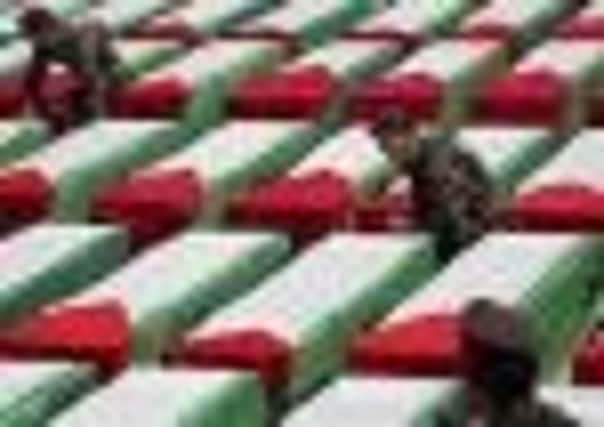Israel releases bodies of 91 Palestine militants


The Israelis said it was a gesture to encourage Palestinian president Mahmoud Abbas to resume peace negotiations. But it quickly became clear the move by itself would have little impact on the poisoned Israeli-Palestinian relationship and was unlikely to do more than provide some closure to the families of militants who had waited years to bury the remains, which had been interred in Israel.
A total of 79 bodies were transported to Ramallah and 12 to the Gaza Strip, where thousands spilled into the streets for a funeral procession. Fighters from the Islamic Jihad movement armed with machineguns and hand grenades wore white robes and masks to symbolise the perceived martyrdom of the suicide bombers.
Advertisement
Hide AdAdvertisement
Hide AdIn Ramallah, the coffins of seven militants who seized hostages at Tel Aviv’s Savoy Hotel in 1975 and demanded the release of Palestinian prisoners were given the highest honours, with each being carried on the shoulders of six of Mr Abbas’s presidential guards. Eight hostages and three commandos were killed in addition to the gunmen during a raid by Israeli forces.
Palestinian Authority cleric Mohammed Hussein said prayers over the 79 coffins, calling the slain militants “the stars of the martyrs”.
Azim Daraghmeh, whose daughter Hiba carried out a suicide bombing at a shopping centre in 2003 that left three Israelis dead and 50 wounded, said he was “joyful” at the return of her remains because it would enable him to give her a burial according to Islamic ritual.
Israeli foreign ministry spokesman Yigal Palmor said: “We have undertaken a humanitarian measure of goodwill intended to enhance chances for a return to negotiations.’’
But Mr Abbas stuck to his demand that Israel freeze all of its settlement construction in the West Bank as a precondition for resuming peace talks, which have been largely moribund for three years. And he criticised Israeli policy in annexed East Jerusalem, saying the government of Benjamin Netanyahu was “changing the features of the city, seizing the Palestinian lands there and harassing its population”.
Palestinian legislator Qais Abdul-Karim termed the return of the remains “positive” but stressed it would have only a limited impact. He said a far more important issue for people was the release of prisoners held in Israeli jails. “What could create a new atmosphere is the release of the 103 prisoners who have been held since before the Oslo Agreement [on Palestinian self-rule in 1993],” he said.
Mr Palmor argued the Palestinian Authority (PA) should return to negotiations unconditionally, and during the talks would be able to raise demands about settlements and prisoners.
But the PA refuses to negotiate while settlements are expanded on the grounds that the act of settlement building creates facts that predetermine the outcome of the negotiations. The population of the West Bank settlements has tripled since the peace process began in the early 1990s.